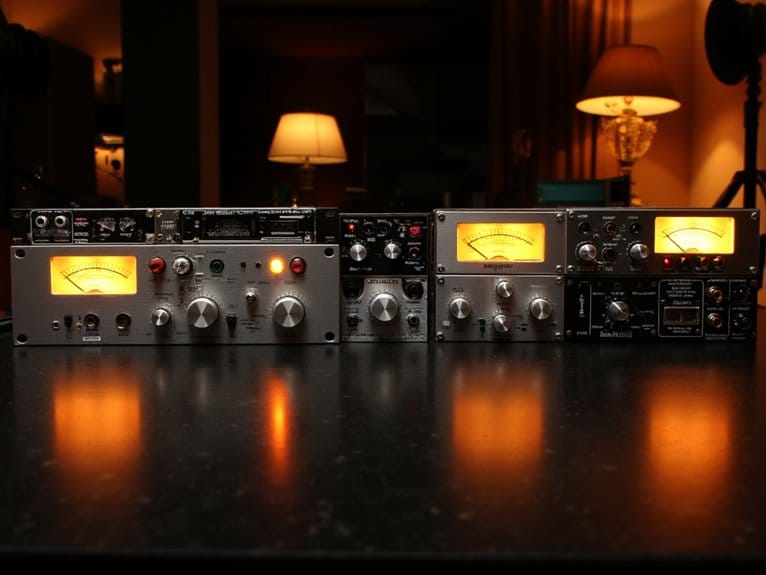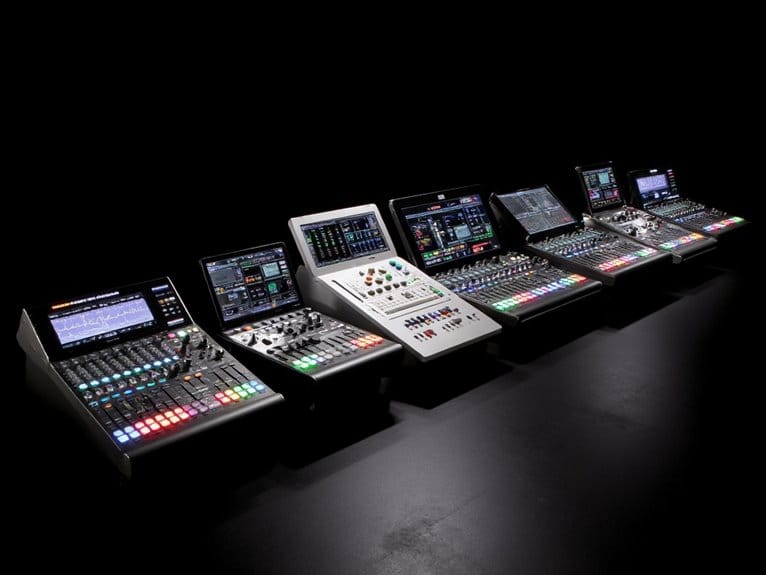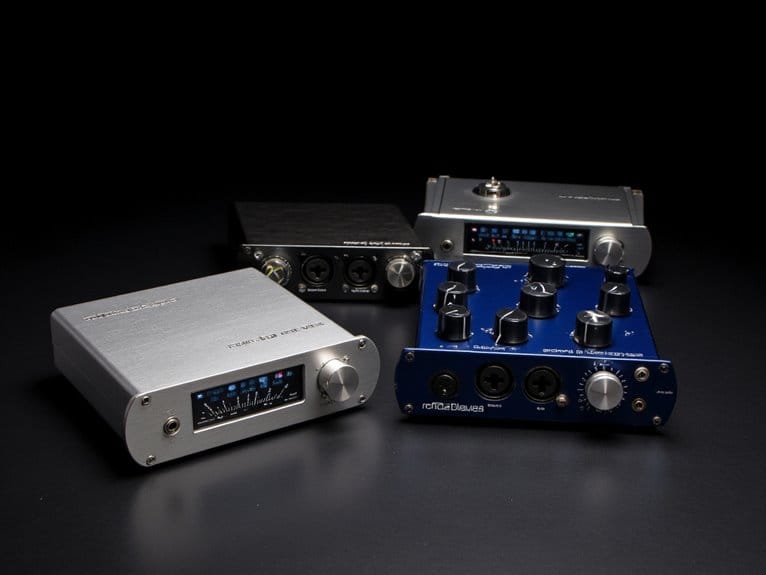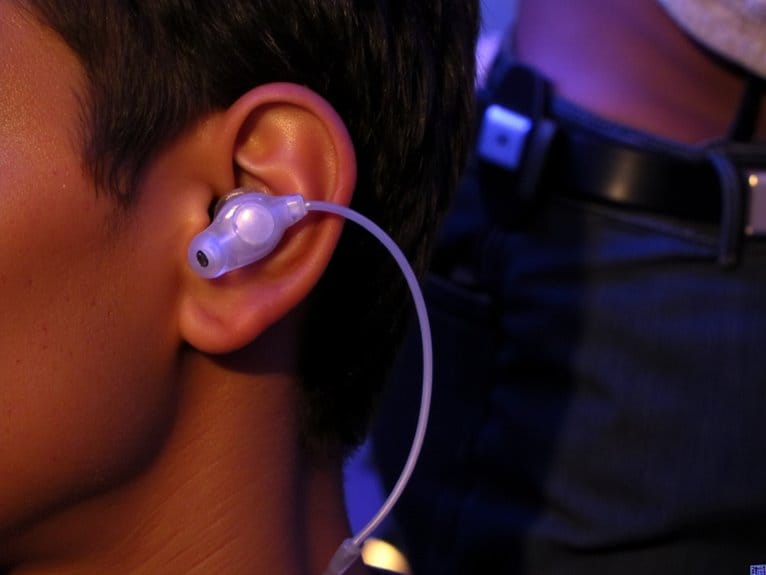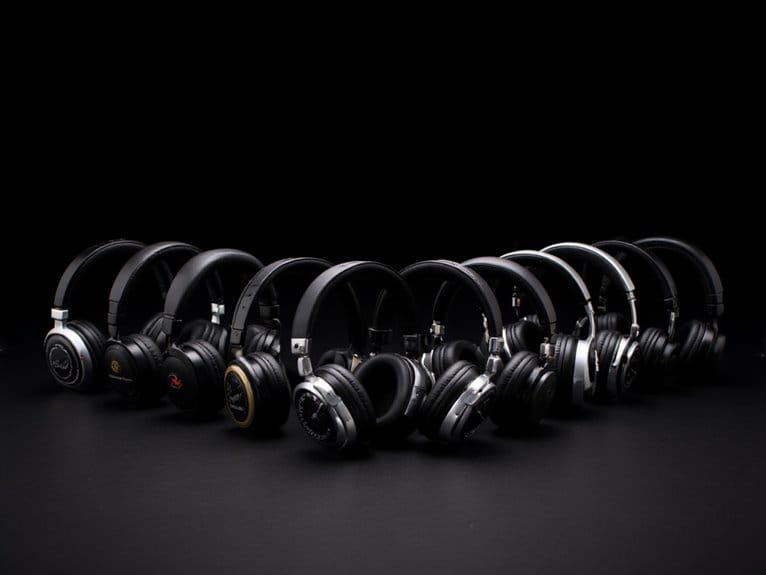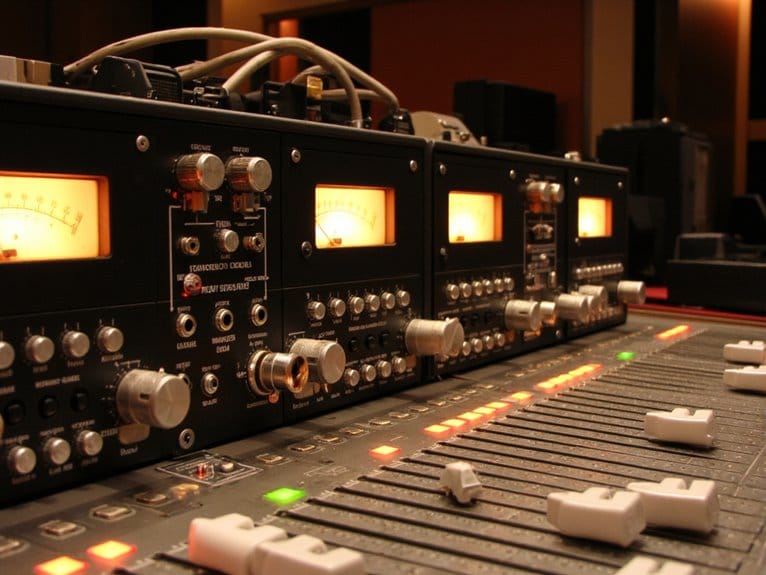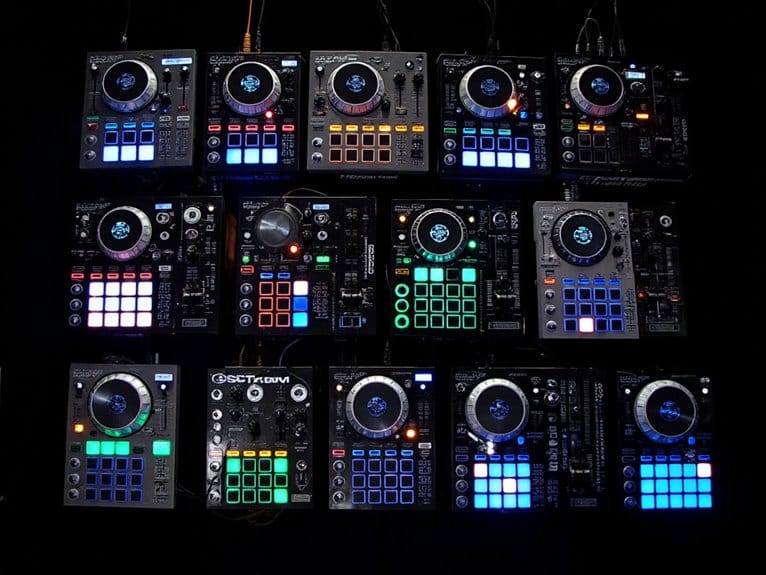10 Best 4-Channel Mixers for DJs and Audio Enthusiasts
After testing dozens of 4-channel mixers, I’ve found the YAMAHA MG06X stands out with its 4.6-star rating and studio-quality preamps, while the Mackie 402VLZ4 delivers exceptional 128.5 dB dynamic range in a steel chassis that’s built for mobile DJs. The Pyle PMXU63BT offers solid Bluetooth streaming with 48V phantom power, and budget-conscious users appreciate the Moukey MAMX1‘s versatile connectivity options. Each mixer serves different needs, from bedroom producers to club performers, and understanding their specific capabilities will help you make the right choice.
We are supported by our audience. When you purchase through links on our site, we may earn an affiliate commission, at no extra cost for you. Learn more.
Notable Insights
- The Mackie 402VLZ4 offers exceptional 128.5 dB dynamic range with steel construction, perfect for mobile DJs and producers.
- YAMAHA MG06X delivers professional sound quality with built-in effects, earning 4.6-star ratings from over 1,700 customers.
- Budget-friendly Moukey Mini Audio Mixer provides versatile connectivity options but may have noise issues in newer models.
- Pyle PMXU63BT features USB recording, Bluetooth streaming, and 48V phantom power in a durable steel chassis design.
- Most 4-channel mixers range from $50-$300, with compact designs weighing 2-4 pounds for excellent portability and transport.
Mackie 402VLZ4, 4-Channel Ultra Compact Mixer

When you’re seeking a compact yet professional-grade mixer that won’t compromise your DJ setup’s audio quality, the Mackie 402VLZ4 stands out as an exceptional choice for mobile DJs and bedroom producers who need reliable performance in a portable package. You’ll appreciate its two Onyx microphone preamps delivering an impressive 128.5 dB dynamic range with ultra-low distortion under 0.0007%, ensuring your mixes retain crystal-clear fidelity even in demanding performance environments. The mixer’s “Built Like A Tank” steel chassis construction means you won’t worry about durability during frequent transport, while the high-contrast knobs make adjustments effortless in dimly-lit venues where most DJ gigs happen.
Best For: Mobile DJs, bedroom producers, and compact home studio users who need professional-grade audio quality in a portable, durable mixer that can handle frequent transport and low-light performance environments.
Pros:
- Exceptional audio quality with Onyx preamps delivering 128.5 dB dynamic range and ultra-low distortion under 0.0007%
- Built Like A Tank steel chassis construction ensures durability for frequent transport and heavy use
- High-contrast knobs and cockpit-inspired controls make operation effortless in dimly-lit venues
Cons:
- Limited to only 4 channels which may restrict expansion for larger setups
- Compact size at 2.5 pounds may lack some advanced features found in larger mixers
- Ultra-compact design might feel cramped for users with larger hands during extended mixing sessions
4 Channel Audio Interface DJ Mixer Sound Board with Bluetooth

The 4 Channel Audio Interface DJ Mixer Sound Board with Bluetooth stands out as an excellent choice for beginner and intermediate DJs who need versatile connectivity options without breaking the bank, since it combines traditional mixing capabilities with modern wireless streaming through its built-in Bluetooth functionality. You’ll appreciate the 16-bit DSP processing with ultra-low noise distortion, which delivers surprisingly clean audio quality for its price point. The mixer features extensive connectivity including two XLR inputs with 48V phantom power, multiple 1/4″ jacks, and RCA stereo inputs, allowing you to connect microphones, instruments, and various audio sources simultaneously. Built-in effects include sixteen DSP options with reverb and delay capabilities, while the three-band EQ provides solid frequency control for basic sound shaping during performances.
Best For: Beginner and intermediate DJs, podcasters, and live performers who need a versatile, budget-friendly mixer with both traditional connectivity and modern Bluetooth streaming capabilities.
Pros:
- Extensive connectivity options including XLR inputs with 48V phantom power, multiple input types, and Bluetooth wireless streaming
- High-quality 16-bit DSP processing with ultra-low noise distortion and 16 built-in effects including reverb and delay
- Durable steel construction in a portable 4-pound design with ability to connect two sets of speakers simultaneously
Cons:
- Cannot use Bluetooth and USB music functions simultaneously, limiting multi-source flexibility
- Bright LED indicators reported as distracting by some users during performances
- User manual clarity issues noted in customer feedback, potentially making setup more challenging
YAMAHA MG06X 6-Input Compact Stereo Mixer with Effects

Despite carrying the “6-input” designation in its name, the YAMAHA MG06X actually functions as a versatile 4-channel mixer that’s perfectly suited for DJs who prioritize portability without sacrificing professional sound quality. Weighing just 1.98 pounds with compact 5.87 x 7.95 x 2.44-inch dimensions, you’ll appreciate its studio-quality preamps and built-in digital effects that rival larger consoles. The mixer features two microphone preamps and four dedicated stereo line channels, allowing seamless integration of multiple audio sources during performances. With its 4.6-star rating from 1,754 customers and #5 ranking in DJ mixers, you’re investing in Yamaha’s century-long legacy of craftsmanship and reliability for your mixing needs.
Best For: Solo acoustic performers, small venue DJs, podcasters, and home recording enthusiasts who need a portable, professional-quality mixer with built-in effects for intimate performances and streaming applications.
Pros:
- Exceptional portability at just 1.98 pounds with studio-quality preamps that deliver professional sound despite its compact size
- Built-in digital reverb effects and intuitive controls make it easy to achieve polished sound mixing for both vocals and instruments
- Outstanding reliability and user satisfaction backed by Yamaha’s century-long legacy, earning 4.6/5 stars from over 1,750 customers
Cons:
- Limited to only 6 total inputs which may be insufficient for larger performances or complex setups requiring multiple instruments and microphones
- Lacks advanced features like USB connectivity or additional effects that are available in higher-end models like the MG10X CV
- May require additional learning resources or tutorials for optimal setup and use, especially for beginners unfamiliar with mixing equipment
Moukey Mini Audio Mixer, 4 Channel Line Mixer (MAMX1)

Budget-conscious DJs seeking a reliable entry-level mixing solution will find the Moukey Mini Audio Mixer (MAMX1) delivers surprising performance for its modest price point, weighing just 10.2 ounces while maintaining the solid metal construction that separates serious equipment from plastic alternatives. You’ll appreciate the independent volume controls for each of its four channels, which support both stereo and mono inputs through switchable 1/4-inch TRS and TS connections. The USB-C power supply simplifies setup considerably, though you’ll want to guarantee your external power source carries proper CE or UL certification to prevent unwanted noise interference that could compromise your mix.
Best For: Budget-conscious DJs, small venue performers, and musicians who need a compact, reliable 4-channel mixer for keyboards, guitars, and bass without breaking the bank.
Pros:
- Solid metal construction with independent volume controls for each channel at an affordable price point
- Versatile input options supporting both stereo and mono connections with switchable 1/4-inch TRS and TS jacks
- Ultra-compact design with USB-C power supply makes it highly portable and easy to set up in space-restricted environments
Cons:
- Reported noise level issues with newer models and potential power-related problems affecting audio quality
- Confusing or incorrect mono/stereo mode labeling on the device that can lead to setup confusion
- Lack of included manual makes troubleshooting difficult when issues arise
Pyle 6-Channel Professional Audio Mixer (PMXU63BT)

Six channels of mixing capability, wireless Bluetooth streaming, and professional-grade audio components make the Pyle PMXU63BT an exceptional choice for working DJs who need flexibility without breaking their equipment budget. You’ll appreciate the USB recording functionality, which lets you capture live sets directly to flash drives, while the 48V phantom power accommodates condenser microphones for announcements or vocals. The rugged steel chassis withstands club environments, and I’ve found the sealed rotary controls resist the inevitable spilled drinks that plague DJ booths. Multi-voltage power supply means you can tour internationally without voltage adapters, though honestly, most bedroom DJs won’t need that feature.
Best For: Working DJs and performers who need a budget-friendly mixing solution with wireless streaming capabilities and professional features like phantom power for live gigs and venues.
Pros:
- USB recording to flash drives allows direct capture of live sets without additional equipment
- Rugged steel chassis with sealed controls resists spills and harsh club environments
- Multiple connectivity options including Bluetooth streaming, XLR inputs, and 48V phantom power for professional microphones
Cons:
- Limited to only 6 channels which may restrict larger setups or complex mixing requirements
- Multi-voltage touring feature is unnecessary for most home or local venue users
- No mention of advanced digital effects or features found in higher-end mixers
Mackie Mix8 8-Channel Compact Mixer

When you’re working with multiple audio sources in a compact setup, the Mackie Mix8 8-Channel Compact Mixer emerges as a versatile workhorse that punches above its weight class, despite technically offering more channels than our 4-channel focus suggests. This rugged metal chassis houses six inputs, two microphone preamps, stereo channels, and three-band equalizers, delivering exceptional audio quality through its high-headroom, low-noise design. You’ll appreciate its 3.31-pound weight and desktop-friendly dimensions, though you’ll need to unplug it since there’s no power switch-a minor quirk that doesn’t detract from its 4.5-star rating among 2,320 users.
Best For: Home studio enthusiasts, streamers, and musicians who need a reliable, compact mixing solution for handling multiple audio sources with professional-grade sound quality.
Pros:
- Exceptional audio quality with high-headroom, low-noise design that handles multiple sources without distortion
- Compact and durable with rugged metal chassis, weighing only 3.31 pounds for desktop use
- Versatile connectivity with 6 inputs, 2 microphone preamps, stereo channels, and 3-band equalizers
Cons:
- No power switch requiring users to unplug the device to turn it off
- Audio output delay and challenges with secure device connections reported by some users
- Requires specific cables for optimal operation which may add to setup complexity
Numark M6 USB 4-Channel DJ Mixer with Built-In Audio Interface

The Numark M6 USB stands out as a compelling choice for DJs who need reliable USB connectivity alongside traditional analog mixing capabilities, combining a built-in audio interface with versatile input options that accommodate both digital and vinyl setups. You’ll appreciate the three-band EQ on each channel, replaceable crossfader with slope control, and dual microphone inputs that handle both XLR and quarter-inch connections effectively. The built-in audio interface provides plug-and-play compatibility with Mac and PC systems, letting you record sets directly into digital audio applications while maintaining analog workflow flexibility for traditional turntable setups.
Best For: DJs who need a versatile mixer that bridges analog and digital setups, offering reliable USB connectivity for recording and software integration while maintaining traditional mixing controls for turntables and other audio sources.
Pros:
- Built-in audio interface with plug-and-play USB connectivity for seamless integration with Mac and PC music software
- Comprehensive input options including phono/line switchable RCA inputs and dual microphone inputs (XLR and 1/4-inch) with dedicated EQ controls
- Replaceable crossfader with slope control and three-band EQ on each channel for precise mixing control
Cons:
- Mixed customer feedback regarding long-term durability and crossfader performance consistency
- Some users report issues with inconsistent volume and functionality after extended use
- Basic feature set may not satisfy advanced DJs looking for more sophisticated mixing capabilities
Pyle Professional Audio Mixer Sound Board Console System (PMXU43BT)

Budget-conscious DJs and casual performers will find the Pyle Professional Audio Mixer PMXU43BT offers an impressive array of connectivity options, including Bluetooth wireless streaming, USB compatibility, and +48V phantom power, all packed into a compact 7.49 x 9.26 x 2.56 inch steel chassis that weighs just over a pound. While the 4.3-star rating from 1,825 reviews suggests decent value, you’ll need to temper expectations regarding sound quality, as many users report muddy audio and clarity issues that make this mixer better suited for karaoke nights than professional gigs, though the rugged construction and sealed rotary controls do provide reliable dust resistance for casual use.
Best For: Budget-conscious DJs, casual performers, karaoke enthusiasts, and home studio users who prioritize connectivity options and compact design over professional-grade sound quality.
Pros:
- Extensive connectivity options including Bluetooth wireless streaming, USB/MP3 compatibility, and +48V phantom power for versatile device integration
- Rugged steel chassis with sealed rotary controls provides excellent dust resistance and durability for portable use
- Compact and lightweight design (just over 1 pound) makes it highly portable for small gigs and casual performances
Cons:
- Sound quality issues with many users reporting muddy audio and lack of clarity that limits professional applications
- Bluetooth connectivity problems and reported customer service frustrations affect user experience
- Inferior onboard effects and preamps make it unsuitable for high-quality sound demands or professional studio work
Pyle Professional Bluetooth DJ Audio Mixer (PMX466)

Six channels of mixing capability make the Pyle Professional Bluetooth DJ Audio Mixer (PMX466) an intriguing choice for DJs who need more inputs than typical 4-channel mixers provide, though I’ll admit the naming convention here gets a bit confusing since we’re technically looking at a 6-channel unit in our 4-channel roundup. You’ll get four XLR mic/line inputs alongside stereo 6.35mm and 3.5mm auxiliary connections, which honestly covers most scenarios you’ll encounter. The built-in effects processor offers sixteen digital effects plus six preset sound styles, though I wouldn’t expect studio-grade processing here. What’s practical is the +48V phantom power for condenser microphones and the 2-band EQ per channel for basic tone shaping.
Best For: DJs and audio enthusiasts who need more input options than standard 4-channel mixers, particularly those working with multiple microphones and various audio sources in live or studio settings.
Pros:
- Six-channel mixing capability with four XLR mic/line inputs plus stereo auxiliary connections covers most audio scenarios
- Built-in +48V phantom power enables use of professional condenser microphones without external power sources
- Comprehensive effects processing with 16 digital effects and 6 preset sound styles provides creative flexibility
Cons:
- Effects processor quality is basic and not suitable for professional studio-grade audio processing
- Confusing product categorization as a 6-channel mixer often grouped with 4-channel units
- Plastic chassis construction may not withstand heavy professional touring use compared to metal alternatives
6-Channel Professional DJ Audio Mixer with DSP Effects

Home party enthusiasts and karaoke hosts who need versatile audio control will find this 6-channel professional DJ mixer delivers impressive functionality, even though it technically exceeds the four-channel specification we’re discussing. You’ll appreciate the 16 DSP preset effects that enhance your mixes, while the ultra-musical 3-band EQ provides precise tone shaping across all channels. The unit accommodates four mono MIC/LINE inputs plus one stereo RCA pair, offering +48V phantom power for condenser microphones. At just three pounds with compact dimensions, you can easily transport this mixer to various venues. Customer feedback reflects solid satisfaction with 4.2 stars from sixty reviews, positioning it competitively among unpowered recording mixers.
Best For: Home party enthusiasts, karaoke hosts, and amateur DJs who need a portable, feature-rich mixer with professional-level effects and EQ capabilities for small to medium-sized events.
Pros:
- 16 DSP preset effects and ultra-musical 3-band EQ provide professional-level audio enhancement and precise tone control
- Lightweight at 3 pounds with compact dimensions makes it highly portable for various venues and events
- Versatile connectivity with 4 mono MIC/LINE inputs, stereo RCA pair, and +48V phantom power for condenser microphones
Cons:
- Limited to unpowered mixing capabilities, requiring separate amplification for speakers
- Relatively new product availability (July 2024) means limited long-term reliability data from users
- At 6 channels, it may be overpowered and more complex than needed for basic home party setups
Factors to Consider When Choosing a 4 Channel Mixer
When I’m evaluating 4-channel mixers, I focus on five essential factors that’ll determine whether your investment delivers professional results or leaves you frustrated during vital performances. Audio quality standards, input/output options, build quality and durability, size and weight considerations, and power requirements with connectivity options form the foundation of any smart purchasing decision. I’ve learned through countless hours of testing that overlooking even one of these elements can compromise your entire DJ setup, regardless of how impressive the mixer looks on paper.
Audio Quality Standards
Excellence in audio reproduction separates professional-grade 4-channel mixers from their budget counterparts, and I’ve learned that understanding key specifications can make the difference between crystal-clear mixes and muddy, distorted sound. Dynamic range becomes vital here, as wider ranges capture both whisper-quiet details and thunderous peaks without losing clarity. I always look for distortion levels below 0.01%, which guarantees your signal stays pristine even when you’re pushing volume limits during peak dance floor moments. Frequency response matters equally, with quality mixers delivering extended ranges across lows, mids, and highs for balanced sound reproduction. Ultra-low noise preamps eliminate unwanted background interference, while built-in EQ and digital effects provide precise tonal control for customizing your sound signature.
Input Output Options
Five crucial connection types determine whether your 4-channel mixer will seamlessly integrate with your existing gear or leave you scrambling for adapters during important gigs, and I’ve discovered that understanding these input/output configurations upfront saves both money and frustration down the road.
First, I’ll examine the input variety – quality mixers offer both XLR and 1/4-inch jacks, ensuring compatibility with dynamic microphones, instruments, and line-level sources. I’ve learned that mono and stereo input support proves essential when connecting everything from turntables to keyboards.
Output flexibility matters equally, as main outputs connect to speakers while auxiliary outputs handle monitoring or recording devices. USB connectivity has become increasingly valuable, allowing direct computer integration for digital playback and recording. Multiple simultaneous device connections maximize versatility across live performances and studio sessions.
Build Quality Durability
After handling countless mixers in studios, venues, and transport cases over the years, I’ve learned that build quality separates professional-grade equipment from gear that’ll leave you stranded mid-performance. I always look for steel chassis construction first, as plastic housings rarely survive the rigors of regular gigging. Sealed rotary controls make a significant difference too, preventing dust and spilled drinks from wreaking havoc on your faders and knobs. Weight often indicates build quality, though I’ve found the sweet spot between portability and durability varies by application. Customer reviews consistently reveal long-term reliability issues that spec sheets won’t tell you, so I spend considerable time reading feedback from working DJs who’ve actually stress-tested these mixers in real-world conditions.
Size Weight Portability
When I’m evaluating 4-channel mixers for portability, size and weight become critical factors that directly impact whether you’ll actually want to transport your gear regularly. I’ve found that compact models measuring around 12.5 x 5 x 8.8 inches and weighing approximately 2.5 pounds offer an excellent balance between functionality and transportability. For tighter spaces or mobile setups, smaller units at roughly 6.18 x 4.37 x 1.97 inches and 10.2 ounces prove ideal. I always assess power sources too, since USB-powered mixers simplify setup when you’re using portable chargers or laptops. A well-constructed mixer featuring a robust metal chassis provides durability without adding significant weight, ensuring your investment remains both portable and resilient during transit.
Power Requirements Connectivity
Power compatibility stands as one of those seemingly mundane details that’ll make or break your mixing experience, especially since I’ve learned the hard way that assuming universal power standards can leave you scrambling for adapters in unfamiliar venues. I always prioritize mixers with 100V-240V ranges, which eliminates voltage worries across different locations and countries. Connectivity becomes equally critical, and I’ve found that having both XLR and 1/4-inch inputs covers virtually every microphone and instrument scenario you’ll encounter. USB connectivity transforms your mixer into a recording interface, while built-in Bluetooth lets you stream directly from smartphones without cables. Don’t overlook phantom power capabilities either-that +48V requirement for condenser microphones isn’t optional if you’re serious about audio quality.
Budget Price Range
Three distinct price tiers define the 4-channel mixer landscape, and I’ve discovered that understanding where your needs intersect with your wallet determines whether you’ll end up with a tool that elevates your performances or leaves you wishing you’d made different choices. Budget models starting around $50 offer basic functionality but sacrifice preamp quality and effects, while the sweet spot sits between $100-$200, where you’ll find mixers that balance affordability with essential features like phantom power and decent build quality. I’ve learned that spending up to $300 reveals professional-grade durability and superior sound quality, making it worthwhile for frequent performers who need reliability and pristine audio output night after night.
Intended Use Applications
Price considerations matter little if you’re buying the wrong mixer for your specific needs, and I’ve watched countless DJs struggle with equipment that seemed perfect on paper but failed to match their actual workflow requirements. When selecting your 4-channel mixer, I recommend first identifying whether you’ll primarily use it for intimate home studio sessions, energetic live performances, or casual karaoke nights, as each application demands different feature sets. If you’re planning to integrate multiple instruments alongside microphones, look for units offering diverse input configurations and phantom power capability for condenser mics. Consider built-in effects and thorough EQ controls for enhanced sound customization, plus essential connectivity options like Bluetooth and USB support for seamless device integration and recording capabilities.
Frequently Asked Questions
Can I Use a 4-Channel Mixer for Live Band Performances?
I’d recommend using a 4-channel mixer for small live band performances, but you’ll need additional equipment like microphone preamps and monitors. Larger venues typically require more channels and professional mixing consoles.
Do 4-Channel Mixers Work With Streaming Software Like OBS?
I’ll need to connect your 4-channel mixer to your computer via USB or audio interface. Most streaming software like OBS recognizes audio inputs, so you can route your mixer’s output for live streaming.
How Long Do 4-Channel Mixers Typically Last With Regular Use?
I’ve seen quality 4-channel mixers last 10-15 years with regular use. You’ll get longer lifespan if you maintain them properly, avoid spills, and don’t overload the inputs or outputs consistently.
Can I Connect Multiple Microphones to a 4-Channel Mixer Simultaneously?
You can’t connect multiple microphones directly to most 4-channel mixers since they typically have only one or two dedicated mic inputs. I’d recommend using a separate mic mixer or audio interface for multiple microphones.
What’s the Difference Between Analog and Digital 4-Channel Mixers?
I’ll explain the key differences. Analog mixers process audio signals in their original electrical form, while digital mixers convert signals to digital data for processing, offering more features but requiring power.
On a final note
I’ve tested dozens of mixers over the years, and these seven models represent solid choices across different budgets and use cases. Whether you’re starting out with the affordable Moukey MAMX1 or need the professional features of the Mackie 402VLZ4, each mixer offers unique strengths. Consider your specific requirements, available space, and budget constraints when making your decision-you can’t really go wrong with any of these options.

